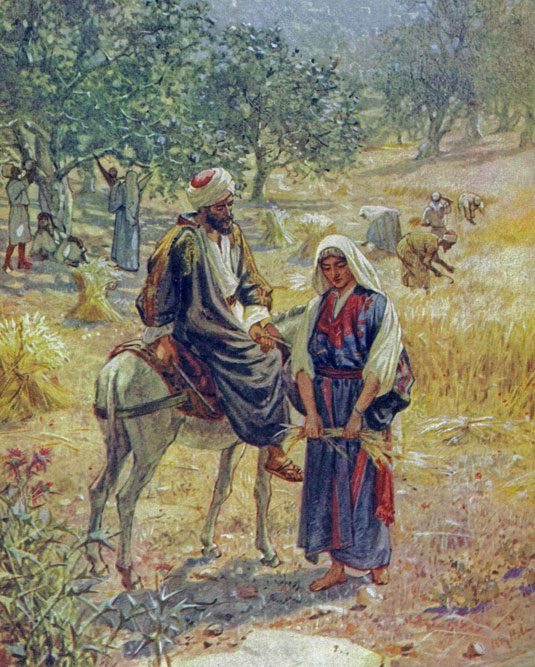 The story of Ruth takes place during the time of the Judges, before Israel was ruled by kings, and also at a time when “every man did what was right in his own eyes.” Israel was in a state of disobedience, and so there was famine in the land of Judah. Because of the famine, Naomi along with her husband and two sons travel to the land of Moab, where they live for ten years. During that time, Naomi’s sons marry two of the local women, named Orpah and Ruth. After acquiring two daughters-in-law, all three women lose their husbands. With no husband and no sons, Naomi decides to return home to Judah. Initially, both daughters-in-law are set to accompany her, but Naomi thinks about the future of these girls. They are young and Naomi knows the life ahead of them will be one of poverty and loneliness, so she encourages them to remain with their own people where they’d have a better chance to remarry. It is here that Naomi makes, what might seem to us, some odd comments about her inability to have more children. Under Jewish law, a provision was made for young widows to be cared for by extended family members in the event of their husbands’ death. The office of the Kinsman-redeemer could be a brother, cousin, or uncle of the husband, who would be called upon to marry the widow, thereby providing for her and carrying on the husband’s name. Part of the duty might also include a business transaction to reclaim lost property.
The story of Ruth takes place during the time of the Judges, before Israel was ruled by kings, and also at a time when “every man did what was right in his own eyes.” Israel was in a state of disobedience, and so there was famine in the land of Judah. Because of the famine, Naomi along with her husband and two sons travel to the land of Moab, where they live for ten years. During that time, Naomi’s sons marry two of the local women, named Orpah and Ruth. After acquiring two daughters-in-law, all three women lose their husbands. With no husband and no sons, Naomi decides to return home to Judah. Initially, both daughters-in-law are set to accompany her, but Naomi thinks about the future of these girls. They are young and Naomi knows the life ahead of them will be one of poverty and loneliness, so she encourages them to remain with their own people where they’d have a better chance to remarry. It is here that Naomi makes, what might seem to us, some odd comments about her inability to have more children. Under Jewish law, a provision was made for young widows to be cared for by extended family members in the event of their husbands’ death. The office of the Kinsman-redeemer could be a brother, cousin, or uncle of the husband, who would be called upon to marry the widow, thereby providing for her and carrying on the husband’s name. Part of the duty might also include a business transaction to reclaim lost property.
If brothers are living together and one of them dies without a son, his widow must not marry outside the family. Her husband’s brother shall take her and marry her and fulfill the duty of a brother-in-law to her. The first son she bears shall carry on the name of the dead brother so that his name will not be blotted out from Israel. Deuteronomy 25:5-6, NIV
If one of your fellow Israelites becomes poor and sells some of their property, their nearest relative is to come and redeem what they have sold. Leviticus 25:25, NIV
Naomi recognizes that she is unable to have more sons who might fulfill that role for her daughters-in-law. She also knows that once the three return to Judah, the young ladies, being foreigners, will be ostracized by the Jewish people. Naomi’s family had also forfeited their land when they moved to Moab, so the three ladies will be poor as well.
After hearing Naomi’s not-so-rosy picture of the future, Orpah is convinced and decides to stay in her homeland, but Ruth implores Naomi to allow her to continue the journey with her.
But Ruth replied, “Don’t urge me to leave you or to turn back from you. Where you go I will go, and where you stay I will stay. Your people will be my people and your God my God. Ruth 1:16, NIV
It is interesting to note that Ruth not only promises to stay with Naomi, but she pledges her alliance to the God of Israel. This is significant, because she is a foreigner who has turned from paganism and become a follower of the true living God. The two women set out for Judah, arriving in Naomi’s home town of Bethlehem, just at the start of the barley harvest.
Since they are poor, Ruth offers to go into the fields to collect remnants of grain left by the men who are harvesting the fields. This was another provision of the law which provided food for the poor people within a community.
“When you reap the harvest of your land, do not reap to the very edges of your field or gather the gleanings of your harvest. Do not go over your vineyard a second time or pick up the grapes that have fallen. Leave them for the poor and the foreigner. I am the Lord your God.” Leviticus 19:9-10, NIV
God required his people to be generous to the poor and to any foreigners living among them, so this law certainly applied to these two ladies. After asking permission to glean behind the reapers, Ruth works diligently all morning. By mid-morning the owner of the field, a man named Boaz, stops by to check on operations. He greets the reapers and then spots an unfamiliar face, so he asks his foreman about her. The foreman identifies Ruth as Naomi’s widowed daughter-in-law, just arrived from the country of Moab. As it turns out, Boaz is a relative of Naomi’s late husband, so his interest is piqued and he immediately goes over to talk to her.
So Boaz said to Ruth, “My daughter, listen to me. Don’t go and glean in another field and don’t go away from here. Stay here with the women who work for me. Watch the field where the men are harvesting, and follow along after the women. I have told the men not to lay a hand on you. And whenever you are thirsty, go and get a drink from the water jars the men have filled.”
At this, she bowed down with her face to the ground. She asked him, “Why have I found such favor in your eyes that you notice me—a foreigner?”
Boaz replied, “I’ve been told all about what you have done for your mother-in-law since the death of your husband—how you left your father and mother and your homeland and came to live with a people you did not know before. May the Lord repay you for what you have done. May you be richly rewarded by the Lord, the God of Israel, under whose wings you have come to take refuge.” Ruth 2:8-12, NIV
Having no idea who Boaz is, Ruth is stunned that a wealthy Jewish land owner should extend such grace to a lowly foreigner. Boaz not only praises Ruth for her steadfast devotion to Naomi, but recognizes her genuine faith in the God of Israel, of whom she’d come to trust.
After their conversation, Boaz invites her to join his workers for lunch. When she returns to the fields, Boaz betrays his feelings for Ruth by telling his reapers to purposely leave gleanings behind for her to pick up.
When she gets home, Ruth tells her mother-in-law all about meeting Boaz. Naomi loves Ruth, and wants her to have an opportunity to remarry and raise a family. She immediately recognizes God’s hand in the situation and understands that Boaz could fulfill the role as Ruth’s Kinsman-redeemer. One provision of the law however, was that it was up to the widow to initiate the transaction. As much as Boaz might love Ruth, he could not approach her with his feelings. She had to let him know that she was interested. Toward the end of the harvest, Naomi instructs Ruth how to drop a less-than-subtle hint that her feelings for Boaz are reciprocated.
Unfortunately, Ruth’s hand in marriage also involves a land transaction, and since there is one more relative closer to Naomi’s late husband than Boaz is, the other man is first in line to purchase the land and thereby marry Ruth. Boaz has to make sure the relative declines his right to the transaction.
Then Boaz said, “On the day you buy the land from Naomi, you also acquire Ruth the Moabite, the dead man’s widow, in order to maintain the name of the dead with his property.”
At this, the guardian-redeemer said, “Then I cannot redeem it because I might endanger my own estate. You redeem it yourself. I cannot do it.” Ruth 4:5-6, NIV
With all obstacles aside, Ruth and Boaz are free to marry! Naomi will be cared for in her old age, and the grief from the loss of her sons is replaced by joy as Ruth presents Naomi with her first grandson, Obed.
The story of Ruth and Boaz is a model of Christ and his Church, where Jesus is the Kinsman-redeemer who buys back, or redeems those who are lost. As Dr. J. Vernon McGee points out, this story is an illustration of God’s love for us, “Redemption is not just a business transaction, but a love affair.”
As it turns out, the story also has a direct connection to Jesus, as little Obed grows up to become the father of Jesse, who becomes the father of King David, who’s line extends 26 generations to a man named Joseph who marries a young woman named Mary who gives birth to the Messiah in Naomi’s home town of Bethlehem.
Ruth’s story was one of dispossession, but God’s provision was one of redemption.
Join me tomorrow for a story involving a pool-side view, a long-term disability, and a provision of strength!
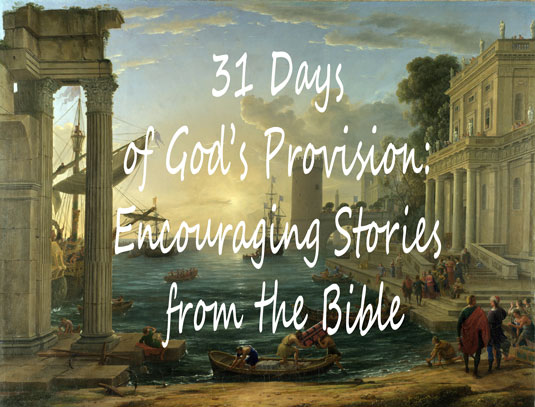 If you’ve missed any part of this series, you can find all of the posts in the side bar category 31 Days of God’s Provision.
If you’ve missed any part of this series, you can find all of the posts in the side bar category 31 Days of God’s Provision.
On the journey toward Home,



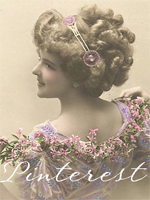



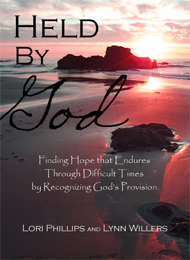



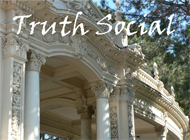
{ 1 trackback }